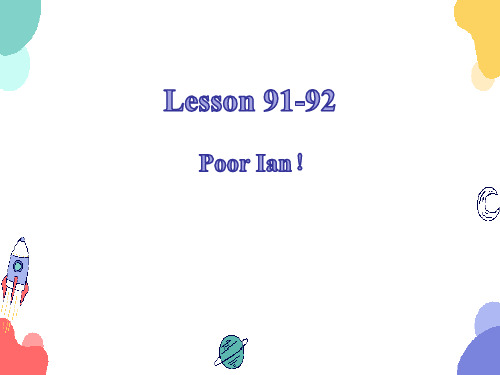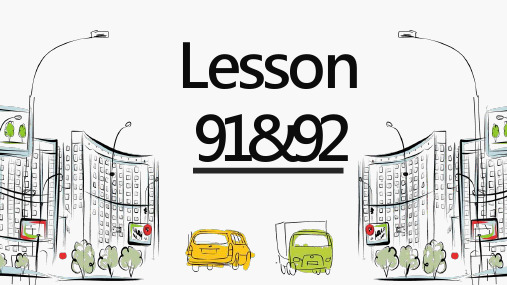新概念英语第一册ppt课件91课
合集下载
新概念第一册Lesson91-92+课件

move /mu:v/ v. ① 搬家 ②移动
eg. ①They moved from Beijing to Changsha.
他们从北京搬到了长沙。 ②Don't move. 别动。
miss /mis/ v. ①想念,思念 ②错过
eg. ①We will miss you if you move. 如果你搬家了,我们会想你的。 ②We missed the bus. 我们错过了那辆公车。
6 people [pi:pəl]n.人们 7 poor [pɔ:] adj.可怜的
still /stil/ adv.还,仍旧
eg. I still want that toy! 我还是很想要那个玩具。
She was still beautifull at the age of 50. 她50岁时依然美丽。
He is seriously ill.He is going to die. He will be twenty years old.
be going to 含有“计划,准备”的意思,而 will 则没 有这个意思,如: She is going to lend us her book. He will be here in half an hour.
92课 When will...?
一般将来时时间状语
T O D AY TOMORBiblioteka OWthis morning
this afternoon
this evening
tonight
TOMORROW tomorrow morning tomorrow afternoon tomorrow evening tomorrow night
afternoon/evening
新概念第一册Lesson_91-92ppt课件

那个可怜的老妇人找不到人和他说话。 2)贫穷的, ↔ rich eg. We must help the poor people.
我们要帮助穷人。
最新版整理ppt
15
Poor Ian.mp3
第一遍 听文章大意~ 第二遍 听力填空~
最新版整理ppt
16
Lesson91— —92.flv
最新版整理ppt
•:
• 坚持记单词,完成作业。你可以在接触一篇新的课文前,先 不要看它的英文,而是根据它的中文翻译自己写再翻译成英 语,然后再和原文对照,这样一经对比,就可以找到自己写 作的弱点和问题,及时修正,日久积累,从而获得提高。。
最新版整理ppt
5
If you persist, you will become a superman
1 Has Ian sold his house yet?
Yes, he has. He sold it last week.
2 Has he moved to his new house yet?
No, he hasn't.
3 When is he going to move?
He is going to move tomorrow. afternoon.
of the room. 他们把课桌移到了房间的左边。
最新版整理ppt
11
miss v. 想念,思念
1)想念,思念
eg. We will miss you if you move.
如果你搬家了,我们会想你的。
I really miss my hometown.
我真的很想念我的家乡。
2)错过
We missed the bus.
我们要帮助穷人。
最新版整理ppt
15
Poor Ian.mp3
第一遍 听文章大意~ 第二遍 听力填空~
最新版整理ppt
16
Lesson91— —92.flv
最新版整理ppt
•:
• 坚持记单词,完成作业。你可以在接触一篇新的课文前,先 不要看它的英文,而是根据它的中文翻译自己写再翻译成英 语,然后再和原文对照,这样一经对比,就可以找到自己写 作的弱点和问题,及时修正,日久积累,从而获得提高。。
最新版整理ppt
5
If you persist, you will become a superman
1 Has Ian sold his house yet?
Yes, he has. He sold it last week.
2 Has he moved to his new house yet?
No, he hasn't.
3 When is he going to move?
He is going to move tomorrow. afternoon.
of the room. 他们把课桌移到了房间的左边。
最新版整理ppt
11
miss v. 想念,思念
1)想念,思念
eg. We will miss you if you move.
如果你搬家了,我们会想你的。
I really miss my hometown.
我真的很想念我的家乡。
2)错过
We missed the bus.
新概念英语第一册91课最新版本ppt课件

着
.
★move v. 搬家;感动 The story moves me. move to 搬到……地方 move in 搬进 move out 搬出来 move away 搬走 move into 搬进(由外到内的过程)
.
★miss v. 想念,思念 ① v. 想念,惦念 ② v. 错过;未做到 He overslept and missed his train. 他 睡过了头,错过了他那班火车。 I missed an opportunity of realizing my dream. 我错过了一个可能实现自己梦想的机会。
.
三 课文
CATHERING:
Has Ian sold his
house yet?
JENNY: Yes, he has. He sold it
last week.
CATHERING:
Has he moved toENNY: No, not yet. He's still
his wife did!
.
1.We'll all miss him. 我们大家都会想念他 的。
all,大家,全部,指3个或3个以上的人或 物;指两个用both。这里的all作we的同位语。 2.…but his wife did.……可是他妻子离开。
句中 did代替上文中的 wanted to leave。 语法 Grammar in use 一般将来时 (1)一般将来时表示将来某一时刻的动作、 状态以及打算。该时态一般与表示将来意义 的时间状语连用,如tomorrow(明天),this month(本月), the day after tomorrow (后天),next week (下周), in two days' time(两天之后), from now on(从 现在起),in the future(将来)等。 (2)一般将来时. 的形式为 will/shall+ 动词 原形。
新概念英语第一册91课课件.ppt

Daily english
• God helps those who help themselves.
• 天助自助者
Lesson 91
•Poor Ian • 可怜的伊恩
★still
① adv. 还是,仍然
• I still can’t decide where to go.
• 我还是不能决定去哪。
未能
I missed buying the magazine. 我未能买到那本杂志。
I missed seeing him yesterday. 昨天我未能/没看见他。
③注意到…的不存在
• When did you miss your bag? • 你什么时候发现提包不见的?
poor
adj. ①可怜的
③ adv. 静止地;安静地
•
He is sitting still.
•
他一动不动地坐着。
•
The patient is lying still.
•
病人安静地躺着。
• ★move • v. ①搬家;移动 • move in 搬进(强调状态,结果) • move into 搬进来(强调动作,过程) • move out (of) 搬出来 move away 搬走 • move from…to… 从…搬到… • They moved from Nanjing to Shenzhen. • 他们从南京搬到深圳。 • ②感动,打动 • This story moved me. • 这个故事感动了我。
neighbour
n. 邻居 neighbourhood n.四邻,邻近地区 This is a quiet neighbourhood. 这一带很安静。 He is moving into the neighbourhood. 他要搬到这一带。 in the neighbourhood of 在…附近
• God helps those who help themselves.
• 天助自助者
Lesson 91
•Poor Ian • 可怜的伊恩
★still
① adv. 还是,仍然
• I still can’t decide where to go.
• 我还是不能决定去哪。
未能
I missed buying the magazine. 我未能买到那本杂志。
I missed seeing him yesterday. 昨天我未能/没看见他。
③注意到…的不存在
• When did you miss your bag? • 你什么时候发现提包不见的?
poor
adj. ①可怜的
③ adv. 静止地;安静地
•
He is sitting still.
•
他一动不动地坐着。
•
The patient is lying still.
•
病人安静地躺着。
• ★move • v. ①搬家;移动 • move in 搬进(强调状态,结果) • move into 搬进来(强调动作,过程) • move out (of) 搬出来 move away 搬走 • move from…to… 从…搬到… • They moved from Nanjing to Shenzhen. • 他们从南京搬到深圳。 • ②感动,打动 • This story moved me. • 这个故事感动了我。
neighbour
n. 邻居 neighbourhood n.四邻,邻近地区 This is a quiet neighbourhood. 这一带很安静。 He is moving into the neighbourhood. 他要搬到这一带。 in the neighbourhood of 在…附近
新概念英语第一册91课(课堂PPT)

Jack will move into his new house tomorrow morning. 今晚杰克将要搬进新家。
★变疑问句
Will you go to America tomorrow? Will Jack move into his new house tomorrow morning? ★变否定句(shan’t/ won’t) I will not go to America tomorrow. Jack will not move into his new house tomorrow morning. ★肯定回答及否定回答
•They swam (swim) across the river the day before
yesterday.
•I haven’t spoken
(not speak) to him yet.
•She gave (give) me a banana two days ago.
•A train left (leave) for London an hour ago.
•…
42
people
• n. ①人们
• There are a lot of people in the street.
• 街上有很多人。
• the people
• 民众,人民,国民
• ②民族
• person 强调的个体的人,可以有复数形式
•
persons
• people 通常是人的统称,单复数形式相同
9
10
11
12
13
14
15
16
17
18
19
20
21
22
★变疑问句
Will you go to America tomorrow? Will Jack move into his new house tomorrow morning? ★变否定句(shan’t/ won’t) I will not go to America tomorrow. Jack will not move into his new house tomorrow morning. ★肯定回答及否定回答
•They swam (swim) across the river the day before
yesterday.
•I haven’t spoken
(not speak) to him yet.
•She gave (give) me a banana two days ago.
•A train left (leave) for London an hour ago.
•…
42
people
• n. ①人们
• There are a lot of people in the street.
• 街上有很多人。
• the people
• 民众,人民,国民
• ②民族
• person 强调的个体的人,可以有复数形式
•
persons
• people 通常是人的统称,单复数形式相同
9
10
11
12
13
14
15
16
17
18
19
20
21
22
新概念英语第一册第91-92课ppt课件

This story moved me.
6
★neighbour
n. 邻居
neighbourhood
n.四邻,邻近地区
这一带很安静。
This is a quiet neighbourhood.
他要搬到这一带。
He is moving into the neighbourhood.
in the neighbourhood of
10
rain snow leave get up arrive finish work have a holiday drive home
have a haircut telephone me have a shave pack his bags sweep the floor paint this room repair my car
He’s still here.
将来时的时间状语
He’s going to move tomorrow.
be going to 打算做某事
25
将来时的时间状语
CATHERING: When? Tomorrow morning?
JENNY:
No. Tomorrow afternoon.
I'll miss him. 思念,想念 错过
make an appointment
11
02
Practice
12
• still • move • miss • neighbour • person • people • poor
v. 想念,思念 n. 邻居 adv. 还,仍旧 v. 搬家 n. 人 adj. 可怜的 n. 人们
13
03
Game Time
6
★neighbour
n. 邻居
neighbourhood
n.四邻,邻近地区
这一带很安静。
This is a quiet neighbourhood.
他要搬到这一带。
He is moving into the neighbourhood.
in the neighbourhood of
10
rain snow leave get up arrive finish work have a holiday drive home
have a haircut telephone me have a shave pack his bags sweep the floor paint this room repair my car
He’s still here.
将来时的时间状语
He’s going to move tomorrow.
be going to 打算做某事
25
将来时的时间状语
CATHERING: When? Tomorrow morning?
JENNY:
No. Tomorrow afternoon.
I'll miss him. 思念,想念 错过
make an appointment
11
02
Practice
12
• still • move • miss • neighbour • person • people • poor
v. 想念,思念 n. 邻居 adv. 还,仍旧 v. 搬家 n. 人 adj. 可怜的 n. 人们
13
03
Game Time
新概念一Lesson91.ppt课件

还,仍旧 搬家 想念 邻居 人 人们 可怜的
Question
• Who wanted to sell the house ?
• 1.Has Ian sold the house yet? • 2.Has he moved out yet? • 3.When will he move to his new house ?
G: Has Ian sold his house yet? J: Yes, he has. He sold it last week. G: Has he moved to his new house yet?
J: No, not yet. He’s still here. He’s going to move tomorrow.
• J: No. Tomorrow afternoon. I’ll miss him. G: When? Tomorrow morning?
He has always been a good neighbour. L: He’s a very nice person. We’ll all miss him. G: When will the new people move into this house? J: I think that they’ll move into the day after tomorrow.
新概念一 Lesson91.
• • • • • • • • • • • •
believe may since why sell because retire cost pound worth penny how long
•v.相信,认为 •v.可以(用与请求) •prep.自从 •adv.为什么 •v.卖,出售 sold sold •conj.因为 •v.退休 •v.花费 cost cost •n.英镑 •prep.值…钱 •n.便士 •多久
新概念91课省名师优质课赛课获奖课件市赛课一等奖课件

• 2. move v. • 搬家 move from .....to ...... 从.....搬到...... • They moved from Nanjing to Beijing. • 移动 • Don't move that table. • 使感动 • The story moved us to tears. • move sb. to tears. 把某人感动得流眼泪。
• Will Jack move into his new house tomorrow morning?
• ◄变否定句(shan't/won't)
• I will not go to China tomorrow.
• Jack will not move into his new house tomorrow morning.
• 构造
• 主语+助动词will/shall+动词原形
• I will go to China tomorrow. 明天 我将去中国。
• Jack will move into his new house tomorrow morning.
• ◄变疑问句
• Will you go to China tomorrow?
Lesson 92 When will..........
• 一般将来时 • 表达将来将要发生旳动作 • tomorrow • next year • this month • the day after tomorrow • the year after the next • in five hours' time.
• ◄肯定回答及否定回答
• Yes, i wll / No, i wபைடு நூலகம்ll not.
- 1、下载文档前请自行甄别文档内容的完整性,平台不提供额外的编辑、内容补充、找答案等附加服务。
- 2、"仅部分预览"的文档,不可在线预览部分如存在完整性等问题,可反馈申请退款(可完整预览的文档不适用该条件!)。
- 3、如文档侵犯您的权益,请联系客服反馈,我们会尽快为您处理(人工客服工作时间:9:00-18:30)。
三 课文 CATHERING: yet? JENNY: last week. CATHERING: house yet? JENNY: here.
Has Ian sold his house Yes, he has. He sold it Has he moved to his new No, not yet. He's still He's going to move
一
词汇
still adv. 还,仍旧 move v. 搬家 miss v. 想念,思念 neighbour n. 邻居 person n. 人 people n. 人们 poor adj. 可怜的
★still adv. 还,仍旧 ① adv. 还是,仍然 I still don’t understand what he meant. ② adv. 还要,甚至更 She looked very ill last week and this week looks still worse. ③ adv. 静止地;安静地 He is sitting still. 他一动不动地坐 着。 The patient is lying still. 病人安静 地躺着
二 语法 一般将来时 概念:打算或将来要发生(做)的事情 结构: S+ will +V原 S+ won’t +V原 Will +S +V原 Yes, S +will. No, S +won’t. 第一人称 I/we shall +V原 shall not =shan’t will除表示纯粹的将来时间外,还表示说话人的意图 和意愿,而shall除了表示将来时间外同时还表示说 话人的责任或决心 与一般将来时连用的时间短语:in a day’s time(一 天以后),in a year’s time(一年以后),in two weeks’ time(两周后),in three months’ time(3 个月后)等等。
will可用于所有人称,但shall仅表示单纯将 来时用于第一人称I和we,作为will的一种替 代形式。 否定缩写: shan't =shall not, won't =will not: I shan't leave tonight. I'll leave tomorrow. 今天夜里我不走。我将于明天离 开。 They won't go to London this weekend. 这个周末他们不去伦敦。 此外,will除了表示纯粹的将来时间外,还表 示说话人的意图和意愿,而shall除了表示将 来时间外同时还表示说话人的责任或决心。 (3)除了will/shall外,还可以用其他方法表 示将来。在口语中,be going to比 will/shall 更为普通, ① v. 想念,惦念 ② v. 错过;未做到 He overslept and missed his train. 他睡 过了头,错过了他那班火车。 I missed an opportunity of realizing my dream. 我错过了一个可能实现自己梦想的机会。
tomorrow. CATHERING: When? Tomorrow afternoon.
JENNY: him. neighbour. LIDA:
No. Tomorrow afternoon. I'll miss He has always been a good
He's a very nice person. We'll all miss him. CATHERING: When will the new people move into this house? JENNY: I think that they'll move in the day after tomorrow. LINDA: Will you see Ian today, Jenny? JENNY: Yes, I will. LINDA: Please give him my regards. CATHERING: Poor Ian! He didn't want to leave this house. JENNY: No, he didn't want to leave, but his wife did!
★move v. 搬家;感动 The story moves me. move to 搬到……地方 move in 搬进 move out 搬出来 move away 搬走 move into 搬进(由外到内的过程)
★miss v. 想念,思念 ① v. 想念,惦念 ② v. 错过;未做到 He overslept and missed his train. 他 睡过了头,错过了他那班火车。 I missed an opportunity of realizing my dream. 我错过了一个可能实现自己梦想的机会。
如: She is going to travel by air. 她打算乘飞机旅行。 也可用来表示有迹象某事即将发生。如: It's going to rain. 将要下雨了。 (4)可与将来时连用的时间短语有: 今天: this morning/afternoon/evening今天上午/下午/晚上 tonight今夜 明天: tomorrow morning/ afternoon/evening明天上午/下午/ 晚上 后天: the day after tomorrow后天 the night after next后天夜 里 其他: in the morning在上午 in the afternoon 在下午 in the evening在晚上
1.We'll all miss him. 我们大家都会想念他 的。 all,大家,全部,指3个或3个以上的人或 物;指两个用both。这里的all作we的同位语。 2.…but his wife did.……可是他妻子离开。 句中 did代替上文中的 wanted to leave。 语法 Grammar in use 一般将来时 (1)一般将来时表示将来某一时刻的动作、 状态以及打算。该时态一般与表示将来意义 的时间状语连用,如tomorrow(明天),this month(本月), the day after tomorrow (后天),next week (下周), in two days' time(两天之后), from now on(从 现在起),in the future(将来)等。 (2)一般将来时的形式为 will/shall+ 动词 原形。
Thank you!
Goodbuy!
【课文翻译】 凯瑟琳:伊恩已指他的房子卖掉了吗? 詹 尼:是的,卖掉了。他上星期卖掉的。 凯瑟琳:他已经迁进新居了吗? 詹 尼:不,还没有。他仍在这里。他打算明天搬家。 凯瑟琳:什么时候?明天上午吗? 詹 尼:不,明天下午。我会想念他的。他一直是个好居。 琳 达:他是个非常好的人,我们大家都会想念他的。 凯瑟琳:新住户什么时候搬进这所房子? 詹 尼:我想他们将会在后天搬进来吧。 琳 达:詹尼,您今天会见到伊恩吗? 詹 尼:是的,我会见到他。 琳 达:请代我问候他。 凯瑟琳:可怜的伊恩!他本不想离开这幢房子。 詹 尼:是啊,他是不想离开,可是他妻子要离开。
★person n. 人 personal adj. 个人的 personality 人格 personality manager 人事管理 者 HR=Human Resource 人力资源 部
★people n. 人们 ten people 十个人 the peoples of China and USA(指两国人民, 用复数形式)
反义疑问句 You’re a student, aren’t you? Yes, I am. No, I’m not. You aren’t a student, are you? Yes, I am. (不,我是一个学生。) No, I’m not. (是的,我不是学生。) He didn’t go to school, did he? 他没有去上学,是吗? No, he didn’t. 是的, 他没去。 Yes, he did. 不,他去了。
